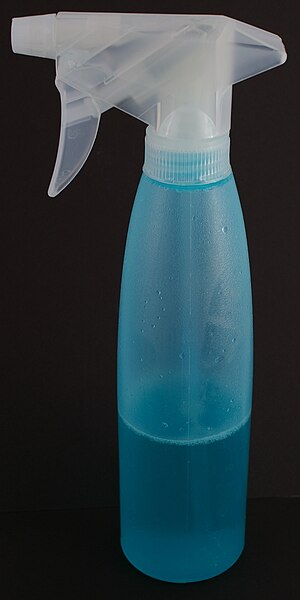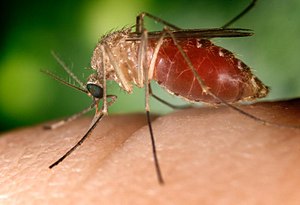| Spray bottle - you'll need one for most recipes. (Photo credit: Wikipedia) |
To combat caterpillars, aphids, and several types of worms, mix a gallon of water and a cup of tobacco. Allow the mixture to set for a day, until it resembles weak tea. Spray on your garden vegetables. However, avoid your peppers, tomatoes, eggplants, or any other member of the solanaceous family, as the tobacco spray can kill them.
2. Garlic Pepper Spray
To combat slugs and a number of other insects, mix together one minced garlic bulb, one minced onion, one quart of water, a tablespoon of cayenne pepper and a tablespoon of dish soap. Spray veggies to protect against bugs.
3. Liquid Dish Soap Spray
This pesticide works quite well on mites for both indoor and outdoor plants. Use natural, biodegradable soaps or something like Murphy’s Oil soap. Mix one cup of soap with one gallon of water. Pour into a spray bottle and mist the leaves of plants. Take care not to overuse because it can slow the growth of fruits and vegetables. However, it is ideal for indoor household plants.
4. Horseradish Spray
| Cayenne Pepper. (Photo credit: Wikipedia) |
5. Yarrow Tea Spray
Great for aphids and other pests, yarrow works quite well as a deterrent when applied every week or so to your garden vegetables. Steep one cup of chopped yarrow in a quart of water for about a day. You can steep it in the sun in a glass container. Strain the mixture, add a cup of coffee and a ¼ teaspoon of liquid dish detergent to help the material adhere to leaves. Pour into spray bottle and chase those pests away.
There’s no reason to let your garden go to the bugs in lieu of using chemical pesticides. Chances are you have the makings for a great bug spray in your home right now. Try one of these home-made pesticides and get rid of bugs naturally and safely.
Got your own recipes that work for you? Feel free to share below!





